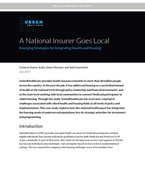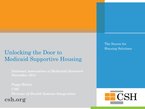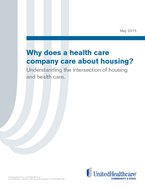Found 52 resources.
0
0
0
Hear from the Corporation of Supportive Housing on ways and supports to use Medicaid resources on topics such as understanding all components of billing Medicaid for intensive supportive housing case management, and staffing and budgeting training. This will be of particular interest for California, Washington State, and the District of Columbia PHAs and their partners, but all are welcome to learn more about what can be achieved in your community.
Topics: Health, Housing, Housing Is Working Group, Medicaid / Medicare
 Shared by Housing Is
on Dec 16, 2024
Shared by Housing Is
on Dec 16, 2024 0
0
0
When Sylvia Blanco and her colleagues from the Housing Authority of the City of Austin were presented with an opportunity to collaborate with UnitedHealthcare Community Plan of Texas, it was an easy decision for them. “We didn’t think twice about the opportunity to partner with UHC,” said Sylvia, their Chief Operating Officer. “The partnership has been tremendous in helping to move the needle on health outcomes for our residents.”
Watch this video to learn how UnitedHealthcare Community Plan of Texas is convening with local organizations to implement innovative and timely solutions in...
Topics: Advocacy, Housing, Medicaid / Medicare
 Shared by Molli Caite Hughes
on Nov 14, 2023
Shared by Molli Caite Hughes
on Nov 14, 2023 0
0
0
June 4-5, 2020, Hosted Virtually via Zoom
Topics: Funding, Health, Housing, Medicaid / Medicare, Summit 2020
 Shared by Steve Lucas
on Jun 12, 2020
Shared by Steve Lucas
on Jun 12, 2020 0
0
0
The Housing and Medicaid Services Pilot Program in Indianapolis, also known as the Blue Triangle Housing Program, is a collaboration that includes Anthem, the City of Indianapolis, a non-profit housing organization, and a community mental health center (CMHC).
Topics: Health, Housing, Medicaid / Medicare, Midwest, Partnerships, Supportive housing
 Shared by Housing Is
on Apr 4, 2019
Shared by Housing Is
on Apr 4, 2019 0
0
0
Emerging health care financing models require much more sophisticated actuarial calculations than previous payment arrangements, often taking into account risk factors such as homelessness. Homelessness also has direct implications for clinical treatment decisions and integrated care models and should be noted in individual patient records. This policy brief provides a rationale for using the ICD-10-CM code for homelessness, outlines the challenges to maximizing this code, and offers strategies to consider to ensure health care providers ask about homelessness and record patients’ housing...
Topics: Health, Homelessness, Housing, Legislation & Policy, Low-income, Medicaid / Medicare
0
0
0
Improved access to health insurance contributed to reducing worry and stress associated with paying rent/mortgage or purchasing meals among low-income people. Expanding health insurance access may have contributed to increasing the disposable income of low income groups.
Topics: Affordable Care Act, Health, Housing, Low-income, Medicaid / Medicare, Mental health, Research, Stability
0
0
0
This series of papers provides an overview and framework for reaching out to stakeholders or potential partners from other sectors that may share your interest in collaborating and sharing data to improve community health. Knowing your audience will help your collaboration craft a successful and productive outreach strategy, strengthen your partnerships, and ensure ongoing sustainability by clearly defining and articulating the value of sharing data across sectors.
Topics: Criminal justice, Health, Homelessness, Housing, Medicaid / Medicare, Partnerships
0
0
0
Integrating health care data with data from other sectors helps address the holistic needs of individual patients while informing the development of population-level programs and policies that can improve outcomes, both in health care and other sectors. This paper provides guidance for those in non-health care sectors (e.g. housing, social services, community-based organizations) on effectively engaging and advancing conversations with health care stakeholders about collaborating to share data, focusing on the specific stakeholder of hospitals/health systems.
Topics: Health, Housing, Low-income, Medicaid / Medicare, Partnerships
0
0
0
The State of Arizona’s Medicaid agency (AHCCCS) recognizes the vital importance of safe, decent and affordable housing to health. With a portfolio of over 3,000 units of affordable housing for Medicaid members with a determination of serious mental illness (SMI) and/or substance use disorder, housing is a major component of how the State of Arizona assists those trying to recover and stabilize.
Topics: Health, Housing, Low-income, Medicaid / Medicare, Partnerships, Place-based
0
0
0
A whole host of factors — such as friends, housing and transportation — affect a person’s health and how much they need the social safety net. It’s time the government’s big health insurance programs took this reality into account, some lawmakers and policymakers are starting to argue.
Topics: Asset building, Cost effectiveness, Disabilities, Education, Food insecurity, Funding, Health, Homelessness, Housing, Legislation & Policy, Low-income, Medicaid / Medicare, Seniors, Transportation, Workforce development
 Shared by Housing Is
on Jan 25, 2019
Shared by Housing Is
on Jan 25, 2019 0
0
0
The State of Arizona’s Medicaid agency (AHCCCS) recognizes the vital importance of safe, decent and affordable housing to health. With a portfolio of over 3,000 units of affordable housing for Medicaid members with a determination of serious mental illness (SMI) and/or substance use disorder, housing is a major component of how the State of Arizona assists those trying to recover and stabilize.
Topics: Cost effectiveness, Health, Housing, Low-income, Medicaid / Medicare, Mental health, Partnerships, Substance abuse
 Shared by Housing Is
on Jan 22, 2019
Shared by Housing Is
on Jan 22, 2019 0
0
0
The nation’s public housing authorities are seeking closer links to health insurers and medical care providers to address social determinants of health.
Topics: CLPHA, Funding, Health, Housing, Low-income, Medicaid / Medicare, Partnerships, Place-based, Research
0
0
0

The Denver Housing Authority (DHA) wins a 2017 Award of Excellence in Client and Resident Services for creating the Health Navigators (HN) program, which provides mental health education, resources, and doctor referrals.
Topics: Disabilities, Health, Housing, Low-income, Medicaid / Medicare, Mental health, Partnerships, Place-based, Seniors
0
0
0
Housing and health systems need to work together. Public housing authorities (PHAs) are significant providers of housing to those in need, offering the health sector scale and expertise. Little was known about how PHAs worked with the health sector writ large. With a national survey, we found that PHAs across the country are engaged in a wide range of partnerships with different health organizations that address various target populations and health priorities. Barriers to housing-health collaboration, such as funding and staffing capacity, can be overcome with cross-system partnerships that...
Topics: Child welfare, Funding, Health, Housing, Low-income, Medicaid / Medicare, Partnerships, Preventative care, Research, Seniors, Smoke-free
 Shared by Housing Is
on Dec 19, 2018
Shared by Housing Is
on Dec 19, 2018 0
0
0

As state and federal officials increasingly search for ways to curb rising health care costs, a decades-old idea is gaining traction: helping people with challenges that have nothing to do with medical care but everything to do with their health.
Topics: Cost effectiveness, Food insecurity, Health, Homelessness, Housing, Low-income, Medicaid / Medicare, Nutrition, Partnerships, Preventative care, Stability, Transportation
0
0
0

HHS Secretary Alex Azar on Wednesday said Medicaid may soon allow hospitals and health systems to directly pay for housing, healthy food or other solutions for the "whole person."
Topics: Health, Housing, Legislation & Policy, Medicaid / Medicare, Mental health, Preventative care
0
0
0
CLPHA’s Housing Is Initiative is engaged in a number of cross-sector activities focused on developing partnerships, facilitating a community of practice, resource development, promoting best practices, online collaboration, policy and advocacy, and training and education. Read about recent activities in this Fall Update.
Topics: Child welfare, CLPHA, Community development, Cost effectiveness, Data sharing, Early childhood, Education, Family engagement, Funding, Health, Homelessness, Housing, Low-income, Medicaid / Medicare, Mental health, Partnerships, Place-based, Post-secondary, Research, Stability, Substance abuse, Workforce development, Youth
0
0
0
Half of public housing authorities (PHAs) are engaged in at least one health initiative, almost all in partnership with the health sector, according to a new report by the Council of Large Public Housing Authorities (CLPHA) and the Public and Affordable Housing Research Corporation (PAHRC).Health Starts at Home: A National Snapshot of Public Housing Authorities' Health Partnerships finds that PHAs are key players in addressing the intersection of housing and health and that deepening partnerships between PHAs and health providers can better serve residents' and communities’ health...
Topics: CLPHA, Dual-eligibles, Health, Housing, Low-income, Medicaid / Medicare, Mental health, Nutrition, Partnerships, Place-based, Preventative care, Research, Seniors
 Shared by Housing Is
on Oct 11, 2018
Shared by Housing Is
on Oct 11, 2018 0
0
0
Neighborhoods where insecure housing overlaps with higher rates of emergency department use may be promising areas for interventions under Medicaid value-based payment
Topics: East Coast, Health, Housing, Low-income, Medicaid / Medicare, Partnerships, Stability
0
0
0
Using administrative data from Massachusetts, this study analyzes the health care use and Medicaid expenditures of families who experienced one or more homeless episodes between 2008 and 2015 to investigate how health care use is related to emergency housing experiences.
Topics: Asthma, Child welfare, Depression, Health, Homelessness, Housing, Low-income, Medicaid / Medicare, Metrics, Pre-natal, Research
0
0
0
UnitedHealthcare provides health insurance benefits to more than 40 million people across the country. In the past decade, it has addressed housing as a social determinant of health at the national level through policy leadership and financial investments, and at the state level working with local communities to connect Medicaid participants to stable housing. Through this work, UnitedHealthcare has overcome a myriad of challenges associated with siloed health and housing fields at all levels of policy and implementation. This case study explores how this national health payer has integrated...
Topics: Affordable Care Act, Data sharing, Funding, Health, Homelessness, Housing, Low-income, Medicaid / Medicare, Partnerships
 Shared by Housing Is
on Aug 9, 2018
Shared by Housing Is
on Aug 9, 2018 0
0
0
Introduction to supportive housing and notes from the field
Topics: Health, Housing, Low-income, Medicaid / Medicare, Mental health, Partnerships, Supportive housing
 Shared by Housing Is
on Aug 9, 2018
Shared by Housing Is
on Aug 9, 2018 0
0
0
In a post health care reform era, Medicaid programs need to build system capacity to effectively manage increasingly complex Medicaid populations while simultaneously seeking innovative solutions to reduce costs and improve access. As states are increasingly becoming more reliant upon managed care for complex populations – such as individuals in need of long-term services and supports, those with intellectual or developmental disabilities, individuals with severe and persistent mental illness, as well as children with special health care needs – the needs of these populations range far beyond...
Topics: Funding, Health, Housing, Low-income, Medicaid / Medicare, Partnerships
 Shared by Housing Is
on Aug 9, 2018
Shared by Housing Is
on Aug 9, 2018 0
0
0
Everyone needs safe, decent, stable housing. For some of the most vulnerable people in America — people with mental illness, chronic health conditions, histories of trauma, and other struggles — a home helps them to get adequate treatment and start on the path toward recovery. But some conditions make it difficult for people to maintain a stable home without additional help. Supportive housing, a highly effective strategy that combines affordable housing with intensive coordinated services, can provide that needed assistance.
Topics: Cost effectiveness, Disabilities, Health, Homelessness, Housing, Low-income, Medicaid / Medicare, Mental health, Place-based, Seniors, Supportive housing
 Shared by Housing Is
on Aug 9, 2018
Shared by Housing Is
on Aug 9, 2018 0
0
0
Annuities, long-term care insurance (LTCI), and reverse mortgages appear to offer important consumption smoothing benefits to the elderly, yet private markets for these products are small. A prominent idea is to combine LTCI and annuities to alleviate both supply (selection) and demand (liquidity) problems in these markets. This paper shows that if consumers typically liquidate home equity only in the event of illness, then LTCI and annuities become substitutes and less attractive. Simulations confirm that without home equity loans, both LTCI and constant real annuities may be welfare...
Topics: Asset building, Health, Housing, Medicaid / Medicare, Seniors
 Shared by Housing Is
on Aug 9, 2018
Shared by Housing Is
on Aug 9, 2018 





